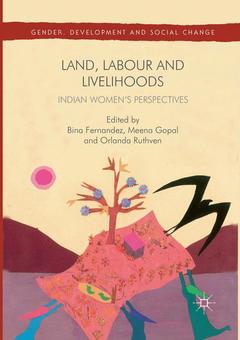Description
Land, Labour and Livelihoods, 1st ed. 2016
Indian Women's Perspectives
Gender, Development and Social Change Series
Authors: Fernandez Bina, Gopal Meena, Ruthven Orlanda
Language: English
Subjects for Land, Labour and Livelihoods:
Approximative price 126.59 €
In Print (Delivery period: 15 days).
Add to cartPublication date: 04-2018
Support: Print on demand
137.14 €
In Print (Delivery period: 15 days).
Add to cartPublication date: 12-2016
Support: Print on demand
Description
/li>Contents
/li>Biography
/li>Comment
/li>
This book brings together a unique collection of theoretical and empirical analyses of women?s access to land, labour and livelihoods in contemporary India. The authors recognize that gender relations must be viewed intersectionally, along with other social relationships such as caste, ethnicity, religion, sexuality and age, in order to inform an integrated analysis of women?s persistent disadvantage in India. The chapters examine a diverse range of rural and urban livelihoods within sectors such as tea plantations, nursing, hair salons, sex work and waste collection. Documenting the shifts in these sectors in the context of economic liberalization, the authors offer insights on the challenges of development interventions as women negotiate shifts in their livelihood options. Written to engage, the contributions to this book will be of interest both to the general reader and to academics and practitioners in development and gender/women?s studies.
Bina Fernandez is Senior Lecturer in Development Studies at the University of Melbourne, Australia. Drawing on her professional experience in the development sector, her research focuses on gender and social policy. Major research awards include an Australian Research Council Fellowship (2015-2017), a British Academy Small Grant in 2010, the UNDP Human Development Fellowship in 2005, and a Chevening Award in 2001-3.
Meena Gopal is Professor at the Advanced Centre for Women's Studies at Tata Institute of Social Sciences, Mumbai. She is also a member of the autonomous feminist collective, Forum Against Oppression of Women in Bombay and a queer feminist activist. Her research focuses on social movements, gender and labour, and public health.
Seeking to combine development practice with research and writing, Orlanda Ruthven works on youth employment and labour standards in India. Over the years she has worked with ILO, Impactt, ODI, IDPM and DFID.
These books may interest you

Women, Land and Power in Asia 58.78 €

Women, Land and Power in Asia 172.36 €


